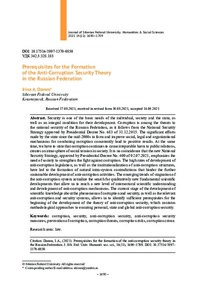Предпосылки формирования теории антикоррупционной безопасности Российской Федерации
Скачать файл:
URI (для ссылок/цитирований):
https://elib.sfu-kras.ru/handle/2311/144847Автор:
Дамм, И. А.
Damm, Irina A.
Дата:
2021-11Журнал:
Журнал Сибирского федерального университета. Гуманитарные науки. Journal of Siberian Federal University. Humanities & Social Sciences 2021 14 (11)Аннотация:
Безопасность выступает одной из базовых потребностей личности,
общества и государства, а также неотъемлемым условием их развития. К числу
угроз национальной безопасности Российской Федерации отнесена коррупция,
как это следовало из Стратегии национальной безопасности, утвержденной
Указом Президента РФ от 31.12.2015 № 683. Предпринимаемые со стороны
государства с середины 2000-х годов значительные усилия по формированию
и совершенствованию социальных, правовых и организационных механизмов
противодействия коррупции последовательно приводят к положительным
результатам. Вместе с тем приходится констатировать, что коррупция продолжает
причинять невосполнимый вред общественным отношениям, создает в обществе
атмосферу социальной напряженности. Неслучайно в новой Стратегии
национальной безопасности, утвержденной Указом Президента РФ от 02.07.2021
№ 400, подчеркивается потребность общества в усилении борьбы с коррупцией.
Высокие темпы развития законодательства о противодействии коррупции, а также
институционализации антикоррупционных структур привели к формированию
закономерных внутрисистемных противоречий, препятствующих дальнейшему
устойчивому развитию антикоррупционной деятельности. Намечающиеся
тенденции стагнации системы противодействия коррупции актуализируют
поиск качественно новых фундаментальных научных разработок, позволяющих
выйти на новый уровень межотраслевого научного осмысления и развития
антикоррупционных механизмов. Современный этап развития научных знаний
о феноменах коррупции и безопасности, а также соответствующих систем
противодействия коррупции и обеспечения безопасности позволяет выявить
достаточные предпосылки для начала разработки теории антикоррупционной
безопасности, содержащей методологические подходы к обеспечению личной,
государственной и глобальной антикоррупционной безопасности Security is one of the basic needs of the individual, society and the state, as well as an integral condition for their development. Corruption is among the threats to the national security of the Russian Federation, as it follows from the National Security Strategy approved by Presidential Decree No. 683 of 31.12.2015. The significant efforts made by the state since the mid‑2000s to form and improve social, legal and organizational mechanisms for combating corruption consistently lead to positive results. At the same time, we have to state that corruption continues to cause irreparable harm to public relations, creates an atmosphere of social tension in society. It is no coincidence that the new National Security Strategy, approved by Presidential Decree No. 400 of 02.07.2021, emphasizes the need of society to strengthen the fight against corruption. The high rates of development of anti-corruption legislation, as well as the institutionalization of anti-corruption structures, have led to the formation of natural intra-system contradictions that hinder the further sustainable development of anti-corruption activities. The emerging trends of stagnation of the anti-corruption system actualize the search for qualitatively new fundamental scientific developments that allow us to reach a new level of intersectoral scientific understanding and development of anti-corruption mechanisms. The current stage of the development of scientific knowledge about the phenomena of corruption and security, as well as the relevant anti-corruption and security systems, allows us to identify sufficient prerequisites for the beginning of the development of the theory of anti-corruption security, which contains methodological approaches to ensuring personal, state and global anti-corruption security
Коллекции:
Метаданные:
Показать полную информациюСвязанные материалы
Показаны похожие ресурсы по названию, автору или тематике.
-
Конфликт интересов работодателя и работника при направлении в служебную командировку
Басалаева, С. П.; Дамм, И.А.; Акунченко, Е.А.; Basalaeva, Svetlana P.; Damm, Irina A.; Akunchenko, Eugeny A. (Journal of Siberian Federal University. Сибирский федеральный университет, 2024-06)Институт конфликта интересов занимает важное место в системе предупреждения коррупции, а также является актуальным объектом научного познания специалистов в различных сферах правового регулирования. Несмотря на ... -
Anti-Corruption Security in the Krasnoyarsk Territory: Overview of the Situation and Trends
Krasnousov, Sergey D.; Красноусов, С.Д. (Сибирский федеральный университет. Siberian Federal University., 2015-11)Based on statistics of corruption crimes in the Krasnoyarsk Territory, the author describes the state of corruption crimes in the region during 1997-2014. The author notes the key role of the media in shaping ideas about ... -
Corruption System against Russia
Nomokonov, Vitaly A.; Номоконов, В. А. (Сибирский федеральный университет. Siberian Federal University, 2020-10)Today the corruption has become a major threat for the national security. Not only individual corrupted officials and embezzlers turn against Russia, but also a huge and powerful corruption system. Analysis of the corruption ... -
Corruption Prevention in Russian Education
Damm, Irina A.; Shishko, Irina V.; Дамм, И.А.; Шишко, И.В. (Сибирский федеральный университет. Siberian Federal University., 2016-09)Prevention of corruption is one of the most important areas of modern state policy of the Russian Federation where the state undertakes a complex of legal and organizational measures. However, the major efforts are focused ... -
Corruption Prevention in Educational Organization (Case Study: Siberian Federal University)
Damm, Irina A.; Дамм, И.А. (Сибирский федеральный университет. Siberian Federal University, 2020-01)In accordance with the legislation of the Russian Federation on countering corruption, educational organisations are obliged to take measures to prevent corruption. At the same time, the content, forms, methods and ...

